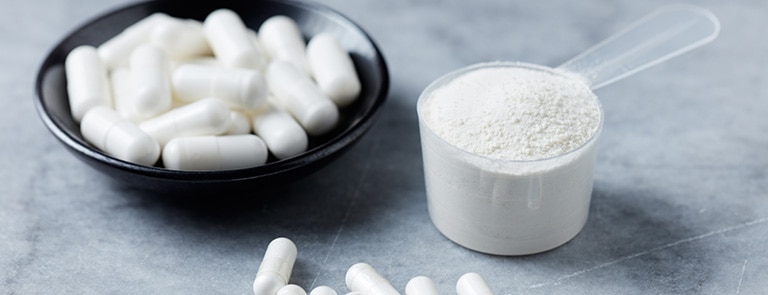15% off €35 or 20% off €45
Code:SUMMER
Beta-alanine: potential benefits, dosage and side effects

Discover the potential power of beta-alanine supplementation. From its possible benefits and side effects, learn everything you need to know in our quick guide
Summary
1What do beta-alanine supplements do?
By supplementing with beta-alanine, studies show that you can elevate the carnosine concentrations in your muscles by up to 80%. It’s thought that...
2Possible benefits of beta-alanine
Beta-alanine may offer several benefits, enhance high-intensity exercise performance, increase aerobic endurance, delay muscle fatigue and more...
3Potential beta-alanine side effects
Some might notice tingling, known as paraesthesia, if they exceed the suggested dosage. This tingling sensation may feel like ‘pins and needles’ on...
There are various dietary supplements out there that promise to boost your performance, increase your energy levels and help you achieve your fitness goals. Among them, beta-alanine is thought to be a popular choice for athletes and fitness enthusiasts. But what exactly is beta-alanine, and how can it benefit you?
In this article, we’ll examine beta-alanine, explore its potential benefits and side effects, and discuss how to add it to your routine.
What is beta-alanine?
Beta-alanine is an amino acid produced in the liver. It’s what’s classed as a non-essential amino acid, which means that your body can make it on its own.1
Unlike other amino acids, researchers suggest that beta-alanine is a unique amino acid in that it doesn't contribute to protein production.2 Instead, it’s thought it combines with histidine, another amino acid, to form carnosine – a crucial compound proposed for muscle health and performance.2,3
According to the latest literature, carnosine can play an important role in maintaining the health of cells, supporting muscle function and protecting against oxidative stress and age-related damage. Experts state that carnosine is mainly stored in your muscles and brain.3,4
Athletes and fitness enthusiasts sometimes supplement with beta-alanine to elevate their exercise performance and improve recovery from high-intensity workouts. Since beta-alanine is primarily found in animal products, supplementation may be particularly beneficial for vegetarians and vegans who may find their diets lacking in this amino acid.5
What do beta-alanine supplements do?
While you can obtain small amounts of beta-alanine from animal-based foods, such as meat, poultry and fish, the amounts are typically too low for noticeable performance enhancement, leading some to opt for beta-alanine supplements.2
Research has shown that beta-alanine supplements can ramp up carnosine levels in your muscles, which may give you an extra nudge during workouts.3
Experts highlight that histidine is usually present in high concentrations in muscle tissues. In contrast, beta-alanine levels are lower, limiting carnosine production.6 By supplementing with beta-alanine, studies show that you can elevate the carnosine concentrations in your muscles by up to 80%. It’s thought that this enhancement may unlock multiple benefits for your workout routine.2,6
Increased carnosine can be a ‘buffer’ against acid build-up in your muscles during intense exercise sessions as one meta-analysis involving 360 participants has found. This buffering capability could allow you to push harder and for longer, which can in turn, enable you to complete more reps or run that extra mile. However, it’s important to note that larger and longer studies need to be conducted 7,8
Possible benefits of beta-alanine
Beta-alanine may offer several benefits. However, more research is needed to fully understand the potential health benefits and risks of beta-alanine supplementation.
But for now, let’s explore what beta-alanine might have to offer as backed by the latest clinical studies.
Beta-alanine has the potential to be a game changer for your workout routines, especially those quick, intense workouts or sprints.
This powerhouse supplement can help buffer acid build-up in your muscles, potentially staving off fatigue, so you could maintain your best performance for longer. Based on the current literature, its benefits are particularly noticeable in short-duration, high-intensity anaerobic exercises – lasting anywhere from 60–240 seconds – where it can significantly prolong your ability to maintain intensity before that familiar burn kicks in.9
For instance, beta-alanine supplements may give track athletes an extra boost, especially in fast-paced races like the 400m sprint, enabling them to sprint harder and longer.10
Beta-alanine can also benefit prolonged activities that depend on your aerobic system. While the improvements here may not be as dramatic as with anaerobic activities, they could still be noticeable.
For activities stretching beyond four minutes, beta-alanine may provide a modest uptick in performance, helping you push a bit further before fatigue sets in. This could be particularly beneficial in endurance sports, such as long-distance running or cycling, where every second can edge you closer to a personal best.9
For example, long-distance runners may keep up their speed for longer stretches.11 Cyclists could see advantages in prolonged races where sustaining a high-power output is crucial.12 Even rowers, especially those competing in middle-distance races like the 2,000m, could experience improvements in their endurance and times.13
It’s worth noting, however, that limited research is available for exercise over 25 minutes in duration. More research is needed to determine the effects of beta-alanine on endurance performance beyond this time frame.9
Beta-alanine could benefit any activity that demands prolonged muscle exertion. One randomised study in 18 men found that supplementing with 6.4g of beta-alanine after 4 weeks of high-intensity workouts may help delay muscular fatigue, allowing you to sustain high-intensity efforts for longer without your muscles tapping out too soon.14
For instance, you could knock out more reps at higher intensities at the gym before feeling the burn, pushing your limits further than you thought possible.8 Climbers could also enjoy longer ascents, as beta-alanine may help stave off muscle fatigue, which is critical for maintaining strong grip and pull strength. But the authors of this study highlight that shorter duration studies need to be investigated more in-depth.15
And it’s not just for solo workouts – team sport athletes, such as basketball players, could also see reduced muscle fatigue from beta-alanine supplementation, primarily through its role in reducing exercise-induced inflammation.16
As we age, maintaining muscle health becomes increasingly important. Beta-alanine supplementation may help combat the decline in muscle carnosine levels, increase exercise capacity and improve muscle endurance. This may allow for prolonged physical activity and stave off fatigue, suggests a few studies.17-19
Such improvements in muscle function aren’t just about staying active – they’re reportedly crucial for safety too. By helping to preserve muscle strength and endurance, beta-alanine may play a role in preventing falls and injuries as one very small double-blind, placebo-controlled study has found. This key finding could help support older adults in maintaining their independence and living life to the fullest.
While beta-alanine is known in the latest research for boosting endurance and high-intensity performance, its impact on strength outcomes is unclear.
Beta-alanine might enhance your strength training by increasing training volume and reducing feelings of fatigue, suggests one or two research studies carried out after 5-8 weeks of resistance or circuit-based training. This means you could perform more reps or sustain higher intensities during your training sessions. These extended efforts could indirectly lead to greater muscle adaptation and strength improvements as your body responds to the increased workload.
However, the direct impact of beta-alanine on maximal strength, such as the heaviest weight you can lift in a single repetition, is still undetermined.20,21
Beta-alanine might not work directly as an antioxidant, but it can boost your levels of carnosine.22
Carnosine is important for your body’s defence system.22 It can help keep harmful molecules, called ‘reactive oxygen species’, in check. These harmful molecules are known to damage cells but it’s thought that carnosine can protect your cells from this oxidative harm and help them to work better as well as potentially promote overall health.23,24
Potential beta-alanine side effects
Research shows that beta-alanine is typically safe when taken in the recommended doses, though some might notice tingling, known as paraesthesia, if they exceed the suggested amount. This tingling sensation may feel like ‘pins and needles’ on the face, neck, upper trunk or the back of the hands.2
According to the current literature, paraesthesia is usually harmless and tends to last between 60–90 minutes.2 If this occurs, you can easily manage it by adjusting your dosage, opting for an extended-release formula or spacing out your doses by at least three hours.2,3
While there aren’t many documented interactions between beta-alanine and other medications, it’s always a good idea to check with your doctor to ensure beta-alanine won’t interfere with any medicines or other supplements you’re taking.
Long-term effects of beta-alanine supplementation are also not known and further research is needed in this area.
How to take beta-alanine
The potential benefits of beta-alanine are thought to build up over time, so consistency is key. Research shows that 4–6g daily can boost muscle carnosine by approximately 64% after 4 weeks and by 80% after 10 weeks.9
Beta-alanine works just as well with or without food. Try spacing out your doses evenly throughout the day to minimise any tingling side effects. For instance, if you’re using 800mg tablets, you could take six tablets throughout the day to reach 4.8g of beta-alanine.9,11
If you’re thinking about taking beta-alanine supplements, speak to your doctor, dietitian or other healthcare professional first about the correct amount of beta-alanine for you.
The final say
Beta-alanine is a dietary supplement with many potential benefits, especially for those enjoying high-intensity workouts or looking to improve their athletic performance. While it may cause minor side effects, adjusting the dosage can lessen them.
As with any supplement, it’s best to consult a healthcare professional before starting, especially if you have pre-existing health conditions or are taking other medications.
The advice in this article is for information only and shouldn’t replace medical care. While we strive for accuracy and balance, please be aware that this article may discuss products available for purchase through Holland & Barrett. Please check with your GP or healthcare professional before trying any supplements, treatments or remedies. Food supplements mustn’t be used as a substitute for a varied and balanced diet and a healthy lifestyle.
- Lopez MJ, et al. Biochemistry, essential amino acids. Treasure Island (FL): StatPearls Publishing; 2022. [cited 2024 Apr 28]. Available from: https://www.ncbi.nlm.nih.gov/books/NBK557845
- Office of Dietary Supplements. Dietary supplements for exercise and athletic performance [Internet]. [cited 2024 May 9]. Available from: https://ods.od.nih.gov/factsheets/ExerciseAndAthleticPerformance-HealthProfessional
- Examine. Beta-alanine [Internet]. [cited 2024 May 9]. Available from: https://examine.com/supplements/beta-alanine
- Perim P, Felipe Miguel Marticorena, Ribeiro F, Barreto G, Gobbi N, Kerksick C, et al. Can the Skeletal Muscle Carnosine Response to Beta-Alanine Supplementation Be Optimized? Frontiers in nutrition [Internet]. 2019 Aug 27 [cited 2024 Jul 4];6. Available from: https://www.frontiersin.org/journals/nutrition/articles/10.3389/fnut.2019.00135/full
- Rogerson D. Vegan diets: Practical advice for athletes and exercisers. J Int Soc Sports Nutr. 2017;14(1). https://doi.org/10.1186/s12970-017-0192-9
- Blancquaert L, et al. Effects of histidine and β-alanine supplementation on human muscle carnosine storage. Med Sci Sports Exerc. 2017;49(3):602–9. https://doi.org/10.1249/MSS.0000000000001213
- Hobson RM, et al. Effects of β-alanine supplementation on exercise performance: A meta-analysis. Amino Acids. 2012;43(1):25–37. https://doi.org/10.1007/s00726-011-1200-z
- Examine. Does beta-alanine increase training volume and reduce perceived effort? [Internet]. [cited 2024 May 9]. Available from: https://examine.com/research-feed/study/9oPe2d
- Trexler ET, et al. International Society of Sports Nutrition position stand: Beta-alanine. J Int Soc Sports Nutr. 2015;12(1):30. https://doi.org/10.1186/s12970-015-0090-y
- Ducker KJ, et al. Effect of beta-alanine supplementation on 800-m running performance. Int J Sport Nutr Exerc Metab. 2013;23(6):554–61. https://doi.org/10.1123/ijsnem.23.6.554
- Santana JO, et al. Beta-alanine supplementation improved 10-km running time trial in physically active adults. Front Physiol. 2018;9:1105. https://doi.org/10.3389/fphys.2018.01105
- Ávila-Gandía V, et al. One-week high-dose β-alanine loading improves world tour cyclists’ time-trial performance. Nutrients. 2021;13(8):2543. https://doi.org/10.3390/nu13082543
- Hobson RM, et al. Effect of beta-alanine with and without sodium bicarbonate on 2,000-m rowing performance. Int J Sport Nutr Exerc Metab. 2013;23(5):480–7. https://doi.org/10.1123/ijsnem.23.5.480
- Milioni F, et al. Effect of β-alanine supplementation during high-intensity interval training on repeated sprint ability performance and neuromuscular fatigue. J Appl Physiol. 2019;127(6):1599–610. https://doi.org/10.1152/japplphysiol.00321.2019
- Sas-Nowosielski K, et al. Beta-alanine supplementation and sport climbing performance. Intl J Environ Res Public Health. 2021;18(10):5370. https://doi.org/10.3390/ijerph18105370
- Turcu I, et al. Effect of 8-week β-alanine supplementation on CRP, IL-6, body composition, and bio-motor abilities in elite male basketball players. Int J Environ Res Public Health. 2022;19(20):13700. https://doi.org/10.3390/ijerph192013700
- Furst T, et al. β-Alanine supplementation increased physical performance and improved executive function following endurance exercise in middle aged individuals. J Int Soc Sports Nutr. 2018;15(1). https://doi.org/10.1186/s12970-018-0238-7
- del Favero S, et al. Beta-alanine (CarnosynTM) supplementation in elderly subjects (60–80 years): Effects on muscle carnosine content and physical capacity. Amino Acids. 2011;43(1):49–56. https://doi.org/10.1007/s00726-011-1190-x
- Stout JR, et al. The effect of beta-alanine supplementation on neuromuscular fatigue in elderly (55–92 years): A double-blind randomized study. J Int Soc Sports Nutr. 2008;5(1). https://doi.org/10.1186/1550-2783-5-21
- Maté-Muñoz JL, et al. Effects of β-alanine supplementation during a 5-week strength training program: A randomized, controlled study. J Int Soc Sports Nutr. 2018;15(1). https://doi.org/10.1186/s12970-018-0224-0
- Benvenutti Bueno de Camargo J, et al. Does beta-alanine supplementation enhance adaptations to resistance training? A randomized, placebo-controlled, double-blind study. Biol Sport. 2023;40(1):217–224. https://doi.org/10.5114/biolsport.2023.112967
- Ostfeld I, Hoffman JR. The effect of β-alanine supplementation on performance, cognitive function and resiliency in soldiers. Nutrients. 2023;15(4):1039. https://doi.org/10.3390/nu15041039
- Boldyrev AA, et al. Physiology and pathophysiology of carnosine. Physiol Rev. 2013;93(4):1803–45. https://doi.org/10.1152/physrev.00039.2012
- Caruso G, et al. The therapeutic potential of carnosine: Focus on cellular and molecular mechanisms. Curr Res Pharmacol Drug Discov. 2023;4:100153. https://doi.org/10.1016/j.crphar.2023.100153




